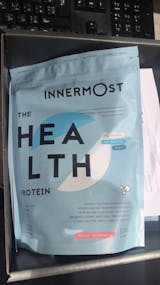If you’re looking for advice when it comes to hitting your fitness goals – whether you’re looking to tone up, slim down or improve your health, you’ve probably come across the idea of a juice cleanse, and thought to yourself, is a juice cleanse a good idea?
If we’re being honest – and we always are, when it comes to juice cleanses, this topic of conversation can spark a bit of debate. Whilst on the one hand, some people who engage in juice cleansing techniques say that they see quick results, claim to enjoy the juices, and cite feeling ‘detoxed’ afterwards (whatever that may mean), many others (the team at Innermost included) are not so sure. We recommend a research-backed, results-proven product like The Detox Booster instead…
This is because there are widespread concerns over the lack of solid foods consumed by users over the time periods of a juice cleanse – and subsequently, the lack of nutrients gained, too. There are even concerns over links to disordered eating due to the extremity of the technique.
Needless to say, these claims shocked us, so we’ve dived a little deeper into the world of juice cleanses, the Master cleanse and everything in between so that you don’t have to.
What is a juice cleanse?
By definition, a juice cleanse is a liquid fast, which means that no solid food is allowed during the dieting period, in favour of juiced fruits.
Juicing is not to be confused with Blending – which involves the blending down of all elements of fruits and vegetables. Not dissimilar, though, as this is another form of liquid fast.
Are juice cleanses good for you?
It’s a popular misconception that because juice cleanses require dieters to simply consume fruit and vegetables, that they’re a hugely healthy alternative.
Whilst it’s correct that the juices consumed during juice diets are formulated through the juicing of fruits and vegetables – which are rich in vitamins and nutrients, the consumption of fruit and vegetables covers just one aspect of a healthy and nutritional diet. Your five-a-day is important, don’t get us wrong, but it’s not the be-all and end-all, guys.
If you’ve been around here a while, you’ll know that as we’re always saying, the key to a healthy diet is nutritional balance, rest and exercise. If you're taking part in a juice cleanse, by living off of a diet that contains just these vitamins and minerals, you are lacking key areas of fuel, and without this balanced diet, our energy levels lack.
Not good.
So, we guess what we’re trying to say here is, juice cleanses aren’t for us.
There are plenty of juice cleanses out there, lasting from ten to forty days in duration, with a particularly popular choice including the Master Cleanse.
We want to break down the Master Cleanse to show just why not. Without further hesitation… what is the Master Cleanse, and why are juice cleanses bad for you? Innermost investigates.
What is the Master Cleanse?
Created all the way back in 1941 by Stanley Burroughs, the Master Cleanse is arguably the most prominently known juice cleanse in the game. Also referred to as the Lemonade Diet, this liquid diet aims to promote weight loss, through the eradication of solid foods over a ten-day period, supposedly ‘detoxing’ your digestive system in the process.
Famed for its supposed anti-inflammatory benefits, weight loss wonders and toxin removing-ways, the Master Cleanse has been used for years. But essentially, there’s no scientific evidence that backs these ‘benefits’ of the Master Cleanse up. Suspicious…
The juice for this cleanse is a mix of lemon, maple syrup and cayenne pepper. Simply mix these ingredients together and drink when you feel any twinges of hunger, with no more than six servings of this concoction recommended in a day.
Should I try the Master Cleanse?
Quite frankly, no. We’re not convinced. Here at Innermost, we’re always going to be advocates for diets that contain plenty of protein, a suitable amount of carbohydrates, and helpings of fruit and vegetables. If you insist on taking part in cleanses such as this one, do it in moderation, and in control combined with a healthy balanced diet. Don’t ditch the solid foods. Please. They’re good for you.
Summary
So, like we said, ditch the juice cleanse. Opt for a vegan, delicious and superfood-packed option instead. Yeah… we’re talking about The Detox Booster. Enough said.























